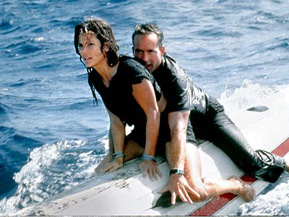Chapter Two
Speed 2: Cruise Control
By Brett Ballard-Beach
August 18, 2011
When his demonic grin and over-caffeinated eyes finally muster up an appearance halfway through, they all too quickly shade over into clichéd psycho with a sneer and a quip at the ready. His final moments should crescendo and then explode (particularly considering how his final scene is quite a bang) but once again, the timing is off and he exits pitiful instead of scarily deranged. For the man who played Bobby Peru and Max Schreck, it isn’t enough. As a warm-up for the Green Goblin, it’s acceptable.
Jason Patric is an intense and intimidating actor at his best playing hard-luck characters right on the gray borderline between hero and villain, redemption and oblivion. He fits in easily with noir (After Dark, My Sweet) and jagged cop dramas (Rush and Narc). Yes, he has The Lost Boys to his name, and he turned in a nifty supporting role as the larger-than-life villain in the comic book adaptation The Losers, but those still have some edge to them. In Speed 2, Officer Alex Shaw has no edge to speak of, no lovable quirks, and outside of stymied attempts to propose to his girlfriend, nothing in the way of any defining character traits.
I think Leonard Maltin can provide me with an appropriate observation. In his capsule review of Backdraft, he notes, “the talented” Jennifer Jason Leigh “fails miserably playing a normal woman.” Patric looks so ill at ease playing the straight-ahead hero in a would-be blockbuster that it undercuts the success of most scenes he is in. This is not to say that he seems unbelievable performing the stunts. Those he actually excels at, with Shaw’s bull-headed rescue of his kidnapped girlfriend in the closing moments elevated by Patric’s single-track intensity. But with little to no chemistry with co-star Sandra Bullock and nobody else for him to really play off of, he is left to tromp around in the water. With refreshing candor, Patric has since admitted he took the part simply for the payday, to help finance Your Friends and Neighbors, the Neil LaBute film he produced the following year and in which he gives what may be his most unsettling and upsetting performance.
And the off casting, the vibe of which extends to most of the film’s performers, is mirrored in the off tone that seems to emanate from the film’s structure. There is the needless cameo and waste of comic legend Tim Conway as a driving instructor in the opening and closing moments. There is the bizarre reappearance of a very minor (and annoying) supporting character from the first film, and said character once again manages to do very little with nothing. There is the blithe attitude towards the destruction (and apparent death of a good number of people) in the climax, which I had thought was strictly the purview of Bruckheimer/Bay action-gasms.
The guests on the cruise ship prove to be indistinguishable from one another except by slight tone alterations in their incessant chattering. They seem to have escaped en masse from David Foster Wallace’s black comic non-fiction portrait of his own particular luxury liner hell in his “A Supposedly Fun Thing I’ll Never Do Again.” James Cameron’s Titanic and yes, even Kevin Costner’s unfairly maligned Waterworld demonstrated that you could attempt and succeed with big-budget high-stakes action set on water, even with a massive vessel at the heart of the your tale. De Bont’s film never figures out what to really do with the cruise ship, much less control it. It’s at the center of everything, and yet, ultimately, it’s nothing.
And I have managed to do it: take Speed 2 on its own terms without bemoaning how it lacks the original’s elevating thrills, tumbling from one audacious and expertly realized set piece to the next. I have highlighted its lack of an emotional core without contrasting that against the way Speed finds time to develop relationships among its characters in between and even during the spurts of action frenzy. I have isolated issues with the hero and the villain and corresponding performances without feeling the need to demonstrate how they pale in comparison to Keanu Reeves’ Zen blankness (as unlikely a template for an action hero as there ever was) and Dennis Hooper’s too-crafty-for-his-own-good public servant turned unwilling retiree/mad bomber.
I especially skirted the hazard of charting the decline of Annie Porter (Bullock), who between the two films morphed from a multi-dimensional woman making the best out of an impossible situation (and given shape by an actress on the rise in one of the great coming-out performances of the ‘90s) to a self-absorbed dithery nattering nabob, unrecognizable as the same person except by name.
I set out to avoid the cheap comparisons and easy potshots and by God I di... whoops.
Next time: “How Bad Do You Want It?” just keeps on coming with a 1970s horror film that is pretty much the ne plus ultra of critically and commercially eviscerated sequels. Is its reputation warranted?
Continued:
1
2
3
|
|
|
|




